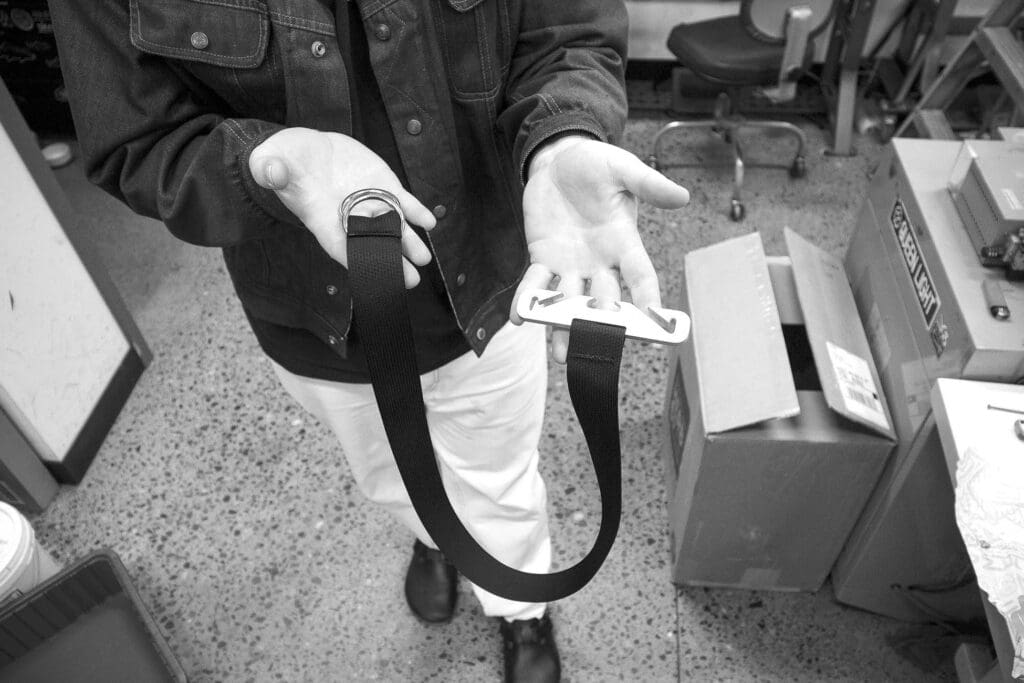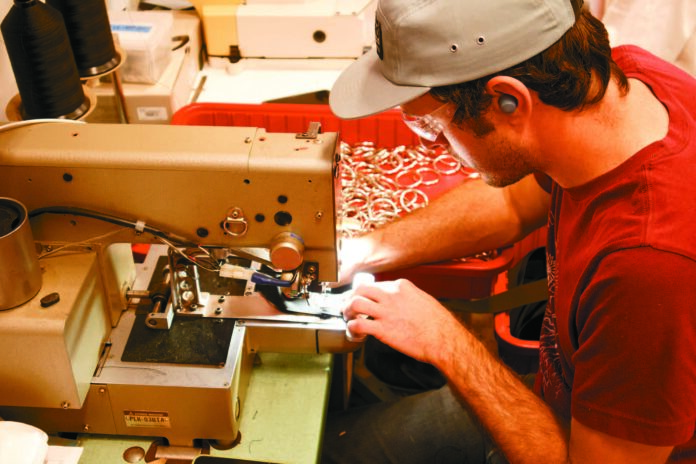It was a Friday when I spoke to Karl Mesedahl, and the previous Wednesday was still at the top of his mind. He and other volunteers had stayed after their shift at Cedaero, a Two Harbors company that makes bike bags, to assemble tourniquets that would be sent to Ukraine. It was round two of the effort to provide those in need with potentially lifesaving medical supplies.
Cedaero shares a roof with the SpokeNGear bike shop and the Cedar Coffee Company, all owned by Dan and Kirsten Cruikshank who have a reputation for responding to calls for help. When the pandemic hit, they began sewing face masks to help meet the demand.
“They have always made it clear that any kind of need that arises, if we’re able to help meet it, that we’d like to be able to do that,” said Masedahl.

So, when Dave Nonnemacher, who works for the non-profit New Horizons USA, asked Cedaero for help, it was, as Mesedahl put it, “an easy sell.”
“We haven’t had any trouble finding volunteers amongst staff or amongst friends in the community to help us with this project,” he said.
“I was standing in Cedaero, and I saw one of Dan’s bags and asked if he thought he could sew a tourniquet,” said Nonnemacher, who has been friends with Cruikshank and other staff members for many years.
Cruikshank responded by showing Nonnemacher a tourniquet model online, one his previous company, Granite Gear, had made for the military. He then contacted his former business partner, Jeff Knight of Knight Vision Development, to help source materials. The Cedaero team quickly got to work, volunteering their time to sew the tourniquets.
Nonnemacher is part of the New Horizons USA non-profit organization and has been working tirelessly to get essential supplies like food, solar lights, water filters, and medical equipment to Ukrainians.
In two rounds of production, Masedahl and other volunteers were able to sew and package 500 tourniquets.
“It seemed like an opportunity and something that we can do. Since we’re uniquely set up with the machinery to do it, it just seemed like a no-brainer. With the right equipment, it’s not difficult and we just happen to have two of the machines that are necessary for making them,” Masedahl said. “Once we have the pieces together, it’s a fairly quick operation.”
The pieces came together in part thanks to a generous donation from a church in California, which helped fund the second round of production. Normally priced at $30 each, Cedaero, in partnership with Knight Vision Development, can make the tourniquets for $6.
Nonnemacher noted that the Mariupol Chaplains Battalion, which distributes many of the supplies, has reported that blood is the greatest need on the front lines. Tourniquets continues to be the second biggest need. “It’s not the severe injuries that kills people, it is the lack of blood. So, this is kind of a big deal.”
Nonnemacher is also involved in an initiative called Ray of Life where volunteers assemble solar light kits that provide a light, nightlight, and a cell phone charger. “The light project is still going strong. We’re moving towards over 700 solar lights in Ukraine,” he said.
Sending materials by air is costly, but Nonnemacher has been working with a shipper whose next shipment, including the recently made tourniquet sewn in Cedaero’s, will be the 27th shipping container of supplies sent to Ukraine since the war started. This lifesaving medical equipment is headed to Zaporizhzhia to be distributed.
Support for the initiative extends beyond Cedaero. Bruce and Jackie Stipe of Little Coyote Lake Pottery created mugs and bowls, now for sale at Cedar Coffee Company, with 100% of proceeds going to Ukraine. Photos of the pottery are available on Cedar Coffee Company’s Facebook page.
“Sometimes people don’t know what to do. They want to do something, but they’re not sure what it is. This is in their wheelhouse, this is what these guys do every day,” said Nonnemacher of Cedaero, who hopes to continue producing more tourniquets as funds are raised.
“Each one of these devices is potentially a lifesaving item. It does draw it into focus pretty sharply,” said Mesedahl, mentioning that one of Cedaero staff members, who spent time living in Eastern Europe, keeps in touch with friends still in the region. “The need is great.”
“I’ve been in villages close to the front. There’s nothing there. There are people but there are no services, no stores, no gas,” said Nonnemacher. “It’s important that people feel prompted to contribute. There’s definitely a need.”
Donations can be made at givemn.org/organization/New-Horizons-Romania. The link is also on Cedaero’s Facebook page. “Six bucks to save a life. Even a contribution of that size is significant,” said Nonnemacher, who is available for questions about the tourniquet initiative, Ray of Life, and New Horizons USA at 218-626-7222.




